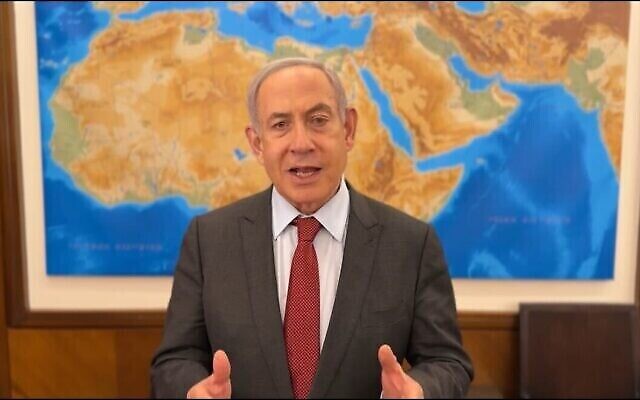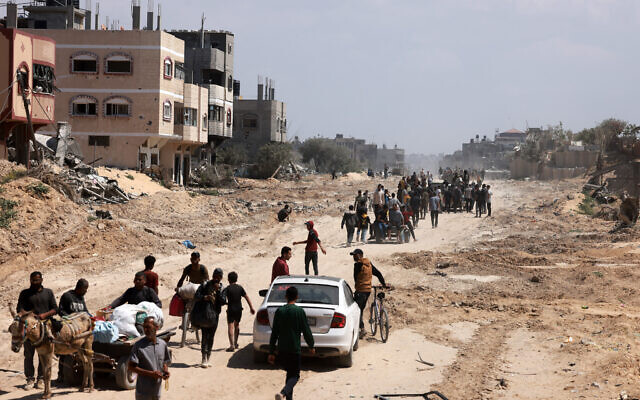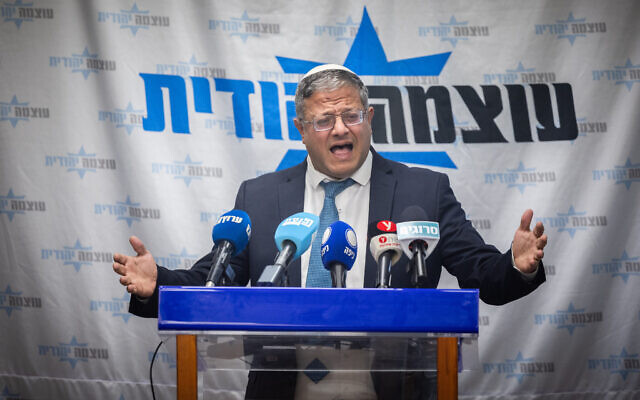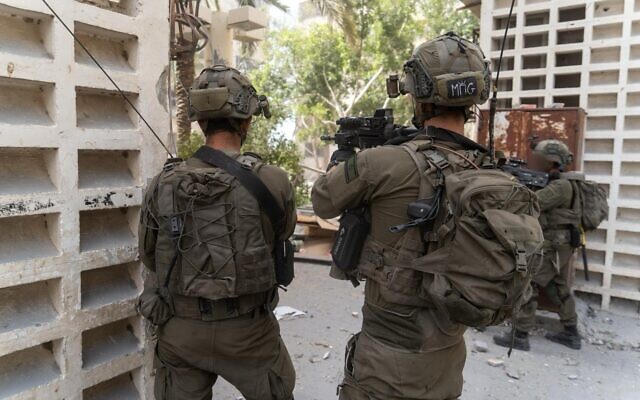Israel has circled date in calendar for repeatedly-pledged Rafah invasion, PM says
Jerusalem hasn’t yet briefed Washington on the matter, Biden administration says, adding that Israel has agreed to hold off until Netanyahu’s aides discuss matter further in DC.

(THE TIMES OF ISRAEL) Prime Minister Benjamin Netanyahu said Monday that he has set a date for the IDF to launch its much-anticipated offensive in the southern Gaza city of Rafah.
“Victory [over Hamas] requires entering Rafah and eliminating the terrorist battalions there. This will happen. There is a date,” Netanyahu said in a video statement, which didn’t reveal the timing of the planned operation.
The premier has announced his authorization of IDF operational plans for Rafah at least four times over the past two months with no offensive anticipated in the immediate future, particularly after the entirely out of the Gaza city of Khan Younis, further shrinking its troop presence in Gaza. The IDF had roughly 30,000 troops in Gaza at the peak of the war and was down to several thousand before the latest withdrawal — far less than the presence required to carry out a major ground invasion.
Four Hamas battalions are believed to be stationed in Rafah along with over a million civilians sheltering in the southernmost city after fleeing fighting in other parts of the Strip. It is also thought to be where Hamas leaders are hidden, possibly along with Israeli hostages.
Plans to mount an offensive there have drawn intense international opposition, including from the US. A video conference last week between US and Israeli officials to discuss a potential IDF ground operation in Rafah was reportedly marked by tensions and accusations as Washington expressed deep skepticism over Israeli plans to operate in the southernmost Gaza city.

In Monday’s video statement, Netanyahu said that there would be no victory without an operation in the city.
“We are constantly working to achieve our goal,” Netanyahu said, “primarily releasing all of our hostages and achieving total victory over Hamas.”
Some analysts have speculated that the prime minister’s continuous pledges about an imminent Rafah operation are meant to hold Hamas’s feet to the fire in the ongoing hostage negotiations. The talks reportedly were reaching an inflection point on Monday, as mediators awaited Hamas’s response to Israel’s latest offer.
US State Department spokesman Matthew Miller said in response later Monday that Israel had not yet briefed the Biden administration on the date on which it plans to enter Rafah.
Miller reiterated that Washington opposes a major invasion in Rafah, arguing that Israel can achieve its war aims through other means. The Biden administration argues that a Rafah offensive will lead to significant civilian harm, cut off aid routes and further damage Israel’s image on the international stage.
White House National Security Council spokesperson John Kirby said Monday that Israel has assured the US that it will not launch a major ground operation before it holds an in-person follow-up to last week’s virtual meeting of top officials, which will likely take place next week.
“We don’t see any signs that such a major ground operation is imminent or that these troops [being withdrawn from Khan Younis] are being repositioned for that kind of ground operation,” Kirby said.
The US is seeking to convince Israel through the high-level meeting to pursue alternatives to a mass invasion, which would include more targeted strikes against Hamas’s leadership in addition to coordinating with Cairo in order to secure the Egypt-Gaza border from continued smuggling, thereby choking off Hamas’s remaining fighters.

National Security Minister Itamar Ben Gvir threatened on X that “if the prime minister decides to end the war without a substantial attack on Rafah to defeat Hamas, he will not have a mandate to continue as premier.”
Opposition Leader Yair Lapid, head of the centrist Yesh Atid party, said he would back up the premier if his far-right partners made due on their threat to protest a hostage deal.
Defense Minister Yoav Gallant said Monday that Israeli troops were withdrawn from the Khan Younis area to prepare for the expected offensive in Rafah.
“The forces came out [of Gaza] and are preparing for their future missions, we saw examples of such missions in action at Shifa [Hospital], and also for their future mission in the Rafah area,” Gallant said following an assessment at the IDF Southern Command.
The fate of civilians in Rafah has been a major area of concern for Israel’s allies,
Last month, the IDF said it plans to direct a significant portion of the 1.4 million displaced Palestinians trapped in Rafah toward “humanitarian islands” in the center of the territory
The Wall Street Journal reported in February that Israel has an evacuation plan for civilians along the coast. The plan envisions 15 sites containing 25,000 tents each across Gaza, running from the southern edge of Gaza City down to the Al Mawasi area north of Rafah.

Israel launched its war on Hamas in Gaza after the terror group’s October 7 massacre in southern Israel, in which close to 1,200 people, mostly civilians, were slain, and 253 were kidnapped to Gaza, where more than half are believed to remain.
Amid the IDF’s ground offensive, launched in late October, 260 soldiers have been killed and 1,552 were wounded.
The Hamas-run Gaza health ministry says more than 33,000 people in the Strip have been killed in the fighting so far, a figure that cannot be independently verified and includes some 13,000 Hamas terrorists Israel says it has killed in battle. Israel also says it killed some 1,000 gunmen inside Israel on October 7.

comments